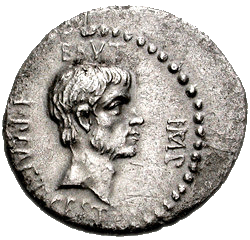
Back Marcus Junius Brutus Afrikaans بروتس Arabic بروتس ARZ Marcu Xunu Brutu AST Mark Yuni Brut Azerbaijani Марк Юній Брут Byelorussian Марк Юний Брут Bulgarian Marcus Junius Brutus Breton Marc Juni Brut Catalan Marcus Iunius Brutus Czech
Marcus Junius Brutus | |
|---|---|
 Brutus on the Ides of March coin, issued shortly before his death | |
| Born | c. 85 BC[a] |
| Died | 23 October 42 BC (aged 42/43) |
| Cause of death | Suicide |
| Nationality | Roman |
| Other names | Quintus Servilius Caepio Brutus |
| Occupation(s) | Politician, orator and general |
| Known for | Assassination of Julius Caesar |
| Office |
|
| Spouses |
|
| Parent(s) | M. Junius Brutus and Servilia |
Marcus Junius Brutus (/ˈbruːtəs/; Latin pronunciation: [ˈmaːrkʊs juːniʊs ˈbruːtʊs]; c. 85 BC – 23 October 42 BC) was a Roman politician, orator,[2] and the most famous of the assassins of Julius Caesar. After being adopted by a relative, he used the name Quintus Servilius Caepio Brutus, which was retained as his legal name. He is often referred to simply as Brutus.[3]
Early in his political career, Brutus opposed Pompey,[4] who was responsible for Brutus' father's death.[5] He also was close to Caesar. However, Caesar's attempts to evade accountability in the law courts put him at greater odds with his opponents in the Roman elite and the senate.[6] Brutus eventually came to oppose Caesar and sided with Pompey against Caesar's forces during the ensuing civil war (49–45 BC). Pompey was defeated at the Battle of Pharsalus in 48, after which Brutus surrendered to Caesar, who granted him amnesty.[7]
With Caesar's increasingly monarchical and autocratic behaviour after the civil war, several senators who later called themselves liberatores (liberators), plotted to assassinate him. Brutus took a leading role in the assassination, which was carried out successfully on the Ides of March (15 March) of 44 BC.[8][9] In a settlement between the liberatores and the Caesarians, an amnesty was granted to the assassins while Caesar's acts were upheld for two years.[10]
Popular unrest forced Brutus and his brother-in-law, fellow assassin Gaius Cassius Longinus, to leave Rome in April 44.[11] After a complex political realignment, Octavian – Caesar's adopted son – made himself consul and, with his colleague, passed a law retroactively making Brutus and the other conspirators murderers.[12] This led to a second civil war, in which Mark Antony and Octavian fought the liberatores led by Brutus and Cassius. The Caesarians decisively defeated the outnumbered armies of Brutus and Cassius at the two battles at Philippi in October 42.[13] After the defeat Brutus took his own life.[14]
His name has been condemned for betrayal of Caesar, his friend and benefactor, and in this respect is perhaps rivalled only by the name of Judas Iscariot, with whom he is portrayed in Dante's Inferno.[15] He also has been praised in various narratives, both ancient and modern, as a virtuous and committed republican who fought – however futilely – for freedom and against tyranny.[16]
Cite error: There are <ref group=lower-alpha> tags or {{efn}} templates on this page, but the references will not show without a {{reflist|group=lower-alpha}} template or {{notelist}} template (see the help page).
- ^ Broughton 1952, p. 576. "M. Iunius Brutus ... (53) Monetal. ca. 60 ... Q. 53 (Cilicia), Leg., Lieut. 49, 48 ?, Propr. ? or Leg., Lieut. ? Gall. Cisalp. 46–45 (early), Pr. Urb. 44, Cur. annon. 44, Procos. Crete 44, Procos. (with imperium maius) Macedonia and the East 43–42".
- ^ Balbo 2013, p. 317.
- ^ Tempest 2017, pp. 25, 150.
- ^ Tempest 2017, p. 50.
- ^ Tempest 2017, p. 238.
- ^ Tempest 2017, pp. 58–59.
- ^ Tempest 2017, p. 239.
- ^ Tempest 2017, pp. 1–3.
- ^ Tempest 2017, pp. 97–104.
- ^ Tempest 2017, p. 241.
- ^ Tempest 2017, p. 117.
- ^ Tempest 2017, p. 169.
- ^ Tempest 2017, pp. 200–208.
- ^ Tempest 2017, p. 208.
- ^ Tempest 2017, p. 218.
- ^ Tempest 2017, pp. 229–230.
© MMXXIII Rich X Search. We shall prevail. All rights reserved. Rich X Search